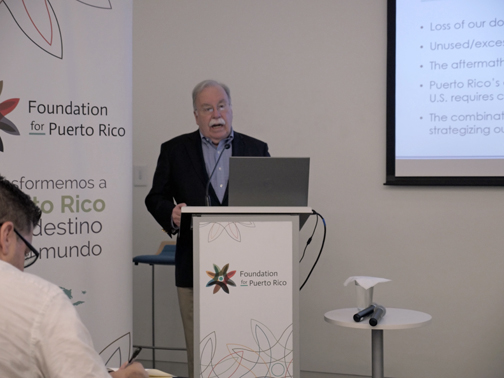Foundation for P.R. bets on visitor economy as ‘engine for reconstruction’


Joaquín VIllamil
Puerto Rico’s “visitor economy” may represent a greater economic impact than tourism statistics alone suggest, so there is a need to design a measuring mechanism to produce a “sustainable, growing cluster of industries that drive further development and growth.”
With that in mind, the Foundation for Puerto Rico commissioned the Estudios Técnicos research firm to come up with a “Visitor Economy Based Economic Development Strategy,” or VE-BEDS, to link all of the elements that make up this sector.
As part of the research, the consulting firm proposed a new conceptual model based on six elements that have an impact on tourism: physical, social, knowledge, institutional, cultural and environmental infrastructures. The pillars are the key elements to ultimately create an innovative reconstruction and economic development model for Puerto Rico.
“What these six elements suggest is that to create an economic development strategy based on the visitor economy, we need to incorporate a wide range of components beyond those typically required to sustain tourism,” said Joaquín Villamil, CEO of Estudios Técnicos.
“This strategy requires changes in each of the mentioned infrastructure to focus on two things: strengthen initiatives related to the visitor; and, secondly, to facilitate linkages with other economic, social and cultural entities,” he explained.
The Foundation for Puerto Rico has been championing on behalf of the island’s visitor economy, and the role it plays in driving activity. Currently, the traditional tourism industry generates $7.1 billion for Puerto Rican economy.
“After [Hurricane] María, our team has been working on a program called the Bottom Up Destination Recovery Initiative, which aims to advance the recovery efforts in Puerto Rico using the visitor economy as a key strategy to create economic opportunities and make the island a resilient destination,” said Foundation for Puerto Rico COO Annie Mayol.
Meanwhile, the nonprofit’s Research and Analysis Director, Arnaldo Cruz, explained that the organization has spent several months working on a pilot program implemented in Orocovis, Isabela/Aguadilla and Punta Santiago in Humacao.
“The idea of this program is that to the extent that a community develops, so do the town and the region where the community is located and, ultimately, the island,” he said.
“But for this to happen, communities need to meet their basic needs and have the necessary infrastructure; a common and strategic plan that integrates community resources. Small businesses have to be successful and grow and expand and have the ability to take control of the solutions,” Cruz said.













